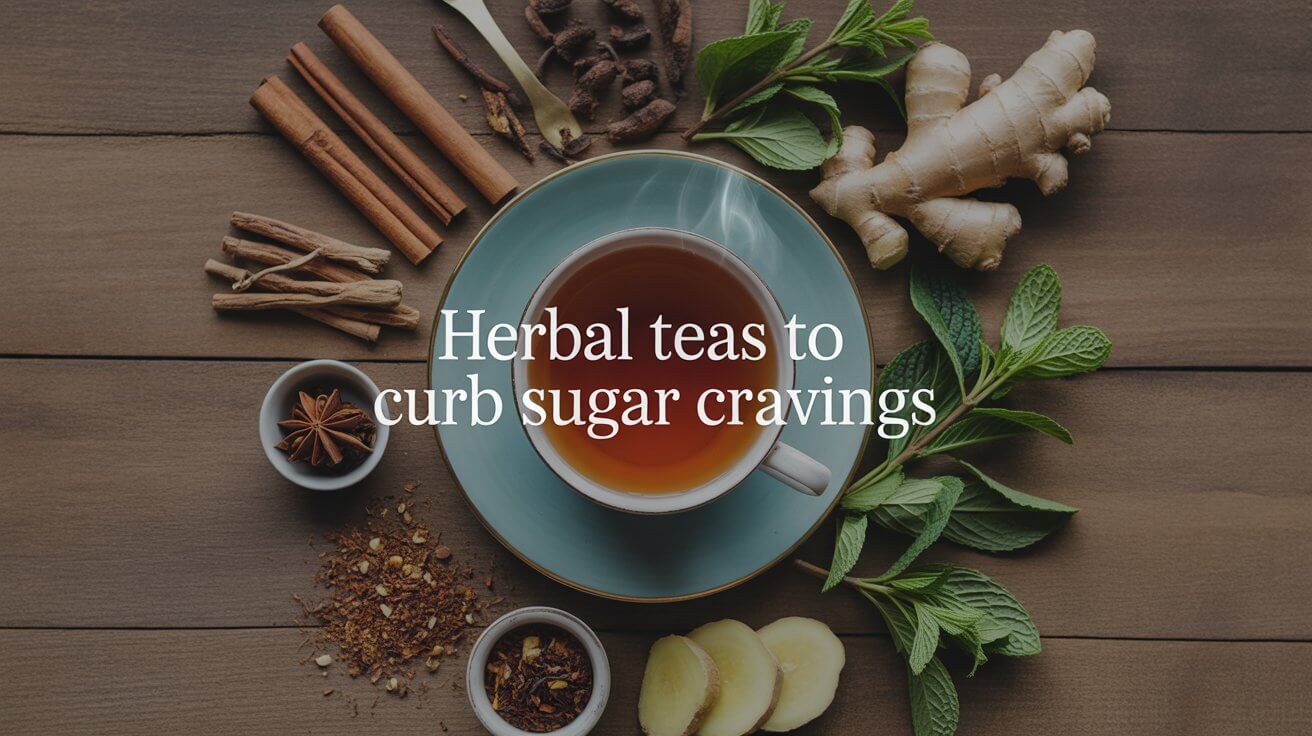Sugar cravings are not just about willpower they’re biological and emotional. According to a 2024 study from the American Journal of Clinical Nutrition, refined sugar stimulates dopamine release in the brain’s reward centers, much like addictive substances. Over time, this creates a “craving cycle” where the body seeks more sugar to maintain that same satisfaction level.
Common triggers include:
-
Blood sugar fluctuations after eating refined carbs
-
Stress and cortisol imbalance, which increase appetite
-
Poor sleep, which reduces leptin (satiety hormone) and increases ghrelin (hunger hormone)
-
Habitual snacking or emotional eating
Breaking this cycle requires stabilizing blood sugar, improving gut balance, and managing stress areas where herbal teas can make a noticeable difference.
How Herbal Teas Help Reduce Sugar Cravings
Herbal teas work through a combination of physiological and psychological effects. Based on 2025 nutrition reviews, they can:
-
Balance blood sugar — Cinnamon, fenugreek, and licorice root help slow glucose absorption.
-
Soothe stress-related cravings — Peppermint, chamomile, and ashwagandha reduce cortisol levels.
-
Mimic sweetness naturally — Some herbs, like licorice root, taste sweet without raising insulin.
-
Support digestion — Ginger and peppermint improve gut motility, helping prevent “false hunger” triggered by bloating or indigestion.
Best Herbal Teas to Curb Sugar Cravings (Expert Picks for 2025)
1. Cinnamon Tea — Natural Blood Sugar Stabilizer
Cinnamon tea remains one of the best herbal remedies for sugar cravings. Research from 2024 suggests it helps cells use insulin more efficiently, reducing post-meal sugar spikes. The mild sweetness also satisfies dessert-like cravings without calories.
Pro tip: Drink cinnamon tea 20 minutes after meals to control blood sugar swings.
2. Licorice Root Tea — Naturally Sweet with Gut Support
Licorice root has glycyrrhizin, a compound 50x sweeter than sugar. It tricks your taste buds, making it ideal when fighting afternoon cravings. It also supports gut health and reduces inflammation.
Caution: Avoid excessive intake if you have high blood pressure moderation is key.
3. Peppermint Tea — Stress and Appetite Control
Peppermint tea doesn’t just refresh; it calms the nervous system and reduces cortisol. Studies from 2025 on workplace stress show peppermint aroma alone can lower sugar cravings linked to fatigue and anxiety.
Best time to drink: Midday or evening to fight emotional snacking.
4. Fenugreek Tea — Fiber-Powered Sugar Regulation
Fenugreek seeds contain soluble fiber (galactomannan) that slows digestion and sugar absorption. Drinking fenugreek tea before meals can reduce glucose spikes and make you feel full longer.
Unique insight: This tea is especially useful for people following clean eating or intermittent fasting routines.5. Rooibos Tea — Antioxidant Alternative to Sugary Drinks
Rooibos tea is caffeine-free and mildly sweet. Its unique compound, aspalathin, helps regulate glucose metabolism and reduces oxidative stress a hidden trigger behind sugar dependency.
Why it stands out: Perfect evening drink when you crave dessert but want a clean, relaxing option.
6. Ginger Tea — Metabolism and Satiety Booster
Ginger improves digestion, increases thermogenesis, and reduces sugar cravings by enhancing satiety signals. A 2024 meta-analysis found regular ginger tea drinkers reported fewer “post-dinner sugar urges.”
Pro tip: Pair ginger with cinnamon for a warming, metabolism-boosting detox blend.
People Also Ask
Does drinking tea reduce sugar addiction?
Yes. Regular herbal tea consumption helps retrain your taste buds away from excessive sweetness. Over time, you’ll naturally prefer subtler flavors.
Can I drink herbal tea on an empty stomach?
Yes, most herbal teas like peppermint or rooibos are gentle enough for an empty stomach. However, teas with strong ingredients like ginger or fenugreek are best consumed after meals.
Which tea is best at night for sugar cravings?
Rooibos or chamomile tea are ideal at night they relax the body, curb cravings, and support better sleep, which helps regulate appetite hormones.
How to Incorporate Herbal Teas into a Clean Eating Routine
You can easily replace sugary drinks with targeted teas throughout the day:
| Time of Day | Recommended Tea | Benefit |
|---|---|---|
| Morning | Cinnamon or Ginger | Stabilize blood sugar and kickstart metabolism |
| Afternoon | Peppermint or Fenugreek | Reduce stress cravings and aid digestion |
| Evening | Rooibos or Licorice Root | Relax the body and satisfy sweet cravings |
Expert Tip (2025): Rotate your teas weekly to keep your taste buds engaged and gain a variety of nutrients.
Extra Lifestyle Tips to Stop Sugar Cravings Naturally
Along with herbal teas, combine these 2025 clean-eating strategies:
-
Eat balanced meals with fiber, protein, and healthy fats.
-
Stay hydrated thirst often mimics sugar hunger.
-
Get 7–8 hours of sleep to regulate hunger hormones.
-
Manage stress with breathing exercises or herbal adaptogens.
-
Keep healthy snacks like nuts or fruit within reach.
Final Thoughts: Can Herbal Tea Really Stop Sugar Cravings?
Absolutely when chosen strategically. Herbal teas like cinnamon, licorice root, and rooibos help retrain your palate, balance blood sugar, and calm emotional triggers that lead to sugar binges.
As of 2025, these natural remedies are supported by both traditional use and modern nutrition research. Incorporating them into a clean eating plan doesn’t just reduce cravings it transforms your relationship with food.


Leave a Reply